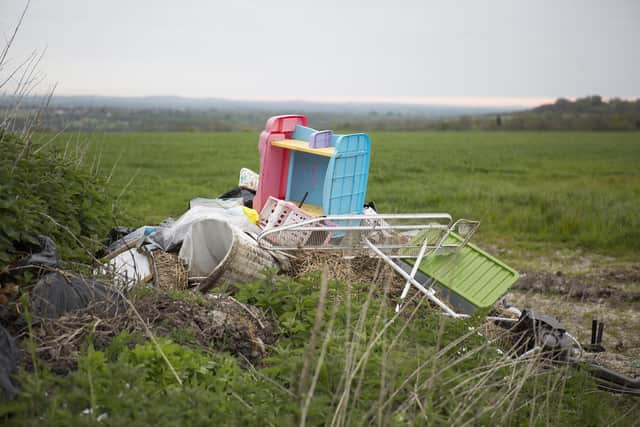Luton and Central Bedfordshire see drop in fly tipping figures despite rising trend regionally
and live on Freeview channel 276
Both Luton and Central Bedfordshire saw a significant drop in fly tipping during the first year of the pandemic, latest figures from the Department for the Environment, Food and Rural Affairs have shown.
The figures were revealed as a rural insurance expert is urging East of England farmers and landowners to take extra steps to protect themselves against fly-tipping this winter, with latest figures revealing a general rise in cases.
Advertisement
Hide AdAdvertisement
Hide AdNeighbouring Bedford saw a large increase in cases over the same period.


In Luton there were 6,190 cases of fly tipping reported in 2019/20. In 2020/21 that had gone down to 4,602. For Central Bedfordshire there were 786 cases in 2019/20 and a drop to 670 in 2020/21. For Bedford there was a rise of almost 1,000 cases to 3063.
According to the Department for the Environment, Food and Rural Affairs (DEFRA), a total of 79,726 fly-tipping incidents were recorded across the region in 2020/21, up from 61,423 during the previous 12 months. Incidents on agricultural land increased, year-on-year, from 338 to 582.
“Fly-tipping is an unwelcome blight on our countryside and can represent far more than an inconvenience to victims of the crime,” said Rupert Wailes-Fairbairn, of rural insurance broker Lycetts.
Advertisement
Hide AdAdvertisement
Hide Ad“Incidents not only pose significant environmental and human health risks, but also a legal and financial burden for farmers and landowners.
“Although local authorities will usually pay the clean-up costs of clearing waste from public land, the responsibility for removing waste from private land falls squarely at the feet of the landowners. If they fail to do so, they can face prosecution.”
Clean-up bills per incident average around £1,000, according to the National Rural Crime Network, but large-scale incidents can cost upwards of £10,000. Mr Wailes-Fairbairn, however, explained that farm businesses can insure the risk.
“In some cases, farmers can be repeatedly targeted and costs can quickly escalate,” he said.
Advertisement
Hide AdAdvertisement
Hide Ad“Many combined farm policies, however, will cover the clean-up costs, typically capped between £10,000 and £15,000 for the insurance period.”
Mr Wailes-Fairbairn pointed out that environmental criminals can be more inclined to act under cover of darkness and that councils will often see a surge of incidents in January as people look to dispose of post festive waste, including Christmas trees.
“For those at risk of being targeted during these dark winter evenings, extra vigilance and a review of security measures is prudent,” he added.
“Prevention is better than cure and steps should be taken to ensure access to land and fields is restricted, where possible, with physical barriers.
Advertisement
Hide AdAdvertisement
Hide Ad“Gates should be locked when not in use and although witnesses of fly-tipping incidents should not approach the perpetrators, by cutting back hedges and installing exterior lighting, visibility for the landowner can be notably improved. The installation of security cameras can also act as a deterrent and help in securing successful prosecutions.”
A spokesman for Central Bedfordshire Council said: “To help us prevent fly-tipping, we urge residents to always dispose of their waste responsibly, either through their regular bin collections or at their nearest Tidy Tip. If your waste is taken away by others, do always check that they have a valid waste carriers’ license, and that they issue you with the correct documentation.”
“Anyone who witnesses fly-tipping or wants to report a fly-tip on council land, can contact 0300 300 8302 or email [email protected]."
And a spokesman for Luton Council said: "Sadly too often people feel that this is a victimless crime, but it is not. Money spent clearing up this anti-social behaviour could be better used supporting and protecting the vulnerable and needy in the town.
Advertisement
Hide AdAdvertisement
Hide Ad"There is a variety of ways for people to get rid of waste. The council has two tidy tips, provides a special collection service for bulky items and opportunities for recycling unwanted items.
"Residents are asked to identify offenders through posting videos on our website and on social media.
"Where it is necessary to dispose of items via a third party service, we urge anyone using a waste disposal company to ensure they are licensed to do this. Any householder whose items are discovered illegal fly tipped will be held responsible for it, even if they hadn’t put it there personally."